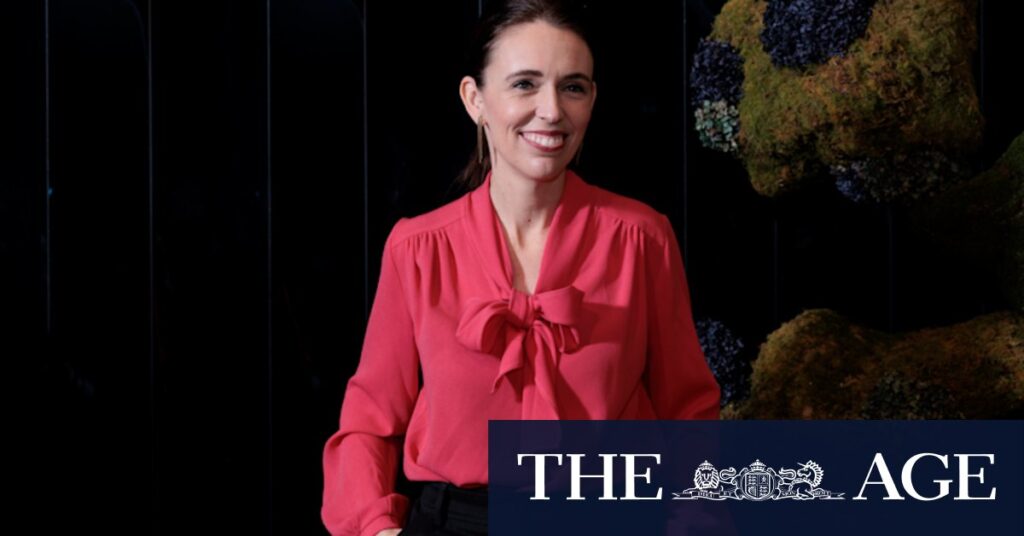
The audience warms to Jacinda Ardern as soon as she starts speaking in a crowded room of political allies in London. In the grand auditorium of Central Hall, across the road from Westminster Abbey, she reflects on her time as prime minister of New Zealand without the wariness of a politician in power. When veteran US Democrat adviser John Podesta introduces her as the former leader of a “midsize country,” Ardern laughs, “Midsize? That’s an upgrade.” The audience, a left-leaning crowd gathered to discuss winning elections against the right, laughs with her.
Ardern brings a buzz to the room as she talks about the future of politics. Her hands swirl through the air as if conducting her words into the audience. She shares the podium with Spanish Prime Minister Pedro Sánchez, following an eminent panel with leaders like Keir Starmer from the UK and Anthony Albanese from Australia. Unlike them, Ardern no longer has to worry about elections or opinion polls, freeing her from constraints and jargon.
Reflecting on Leadership and Legacy
It’s been more than two years since Ardern stepped down as prime minister. Her early leadership saw her gain international attention after giving birth to her daughter while in office and for her handling of the 2019 Christchurch massacre. An opinion poll once placed her as the most popular PM in a century. However, the pandemic’s challenges led to tough decisions on border closures and vaccine mandates, resulting in rising public animosity and sinking poll ratings. She resigned in January 2023 and relocated overseas with her family.
Now, Ardern has become a guide on leadership, teaching at Harvard University and Oxford University. These roles have allowed her to settle in England with her husband, Clarke Gayford, and their daughter, Neve. Ardern’s new career keeps Neve away from the stress and attention of their former lives.
Documenting the Human Side of Politics
Ardern is the subject of a revealing documentary titled Prime Minister, showcasing the inside story of her time in office. The film draws on 300 hours of footage, including personal videos taken by Gayford. It shows Ardern dealing with terror attacks, the coronavirus, and motherhood without the usual political facade. Ardern expresses no concern about audiences seeing her cry during tough decisions, stating, “Empathy is not weak. If anything, we’re lacking it in politics.”
This documentary aims to rehumanize leadership, showing that strong, courageous decisions can be made while being human. Ardern’s approach challenges the aggressive nature of modern politics, where leaders like Donald Trump have redefined the norms with populist and often divisive tactics.
Ardern’s Vision for Empathetic Leadership
Ardern rejects being labeled the “anti-Trump,” emphasizing that leaders should not be defined by others. She advocates for a political culture that values consensus and humanity over confrontation. “I push back against defining all politics around one particular style,” she says, focusing instead on empathetic leadership.
Her story is one of unexpected successes and setbacks. Ardern was born in 1980 in Hamilton, New Zealand, and raised in a Mormon family. Her political journey began as an adviser before entering parliament at 28. She became prime minister at 37, leading New Zealand through significant events like the Christchurch massacre and the COVID-19 pandemic.
“Most people were motivated by making change for the better. Somewhere along the way, people have lost the sense that people in politics are motivated by that.” — Jacinda Ardern
Ardern’s determination to change how extreme violence spreads online led to the Christchurch Call, an international agreement to curb streaming of terrorist content. This initiative, supported by leaders worldwide, reflects her belief in the potential for positive change in politics.
Looking Forward
Ardern’s message resonates globally, as seen in her interviews with prominent figures like Oprah Winfrey and Stephen Colbert. She continues to advocate for progressive politics, preparing for a time when voters may tire of populist promises. Her approach suggests that kindness and empathy in politics can yield results, as demonstrated by leaders like Anthony Albanese and Mark Carney.
While Ardern has left high office, her mission to rehumanize politics is far from over. Her documentary and public engagements aim to inspire a new generation of leaders who prioritize empathy and humanity in their political endeavors.






